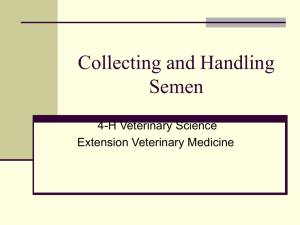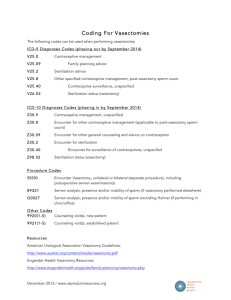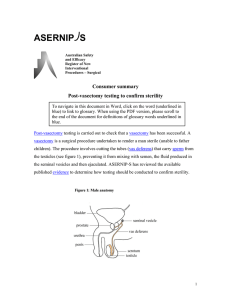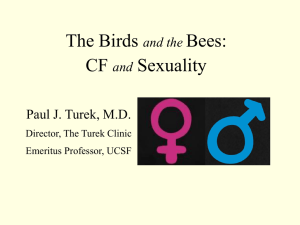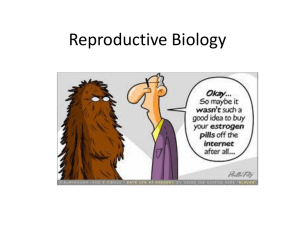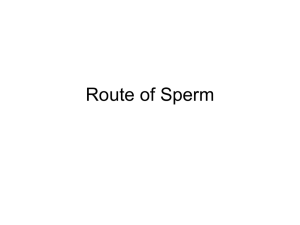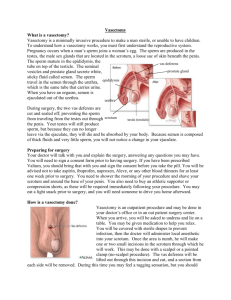AUA-VASECTFinal - Dr. Harry Fisch, M.D
advertisement
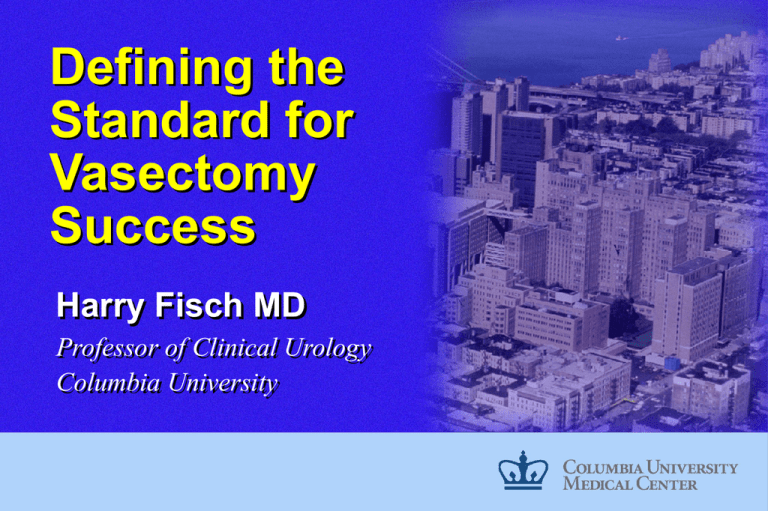
Defining the Standard for Vasectomy Success Harry Fisch MD Professor of Clinical Urology Columbia University Controversies Regarding Vasectomy Management 1. Is vasectomy a permanent form of birth control? 2. When do we obtain a post-vasectomy semen analysis? 3. What is the significance of motile and non-motile sperm in the post-vasectomy semen analysis? 4. Does azoospermia after vasectomy guarantee that sperm will not reappear? 5. Do we need to centrifuge azoospermic semen after vasectomy in order to detect occasional sperm? 1. Is vasectomy a permanent form of birth control? Vasectomy is Not Guaranteed Vasectomy pregnancy failure rate of 0.1% Early-unprotected intercourse prior to obtaining a negative semen analysis Late-recanalization of the vas deferens Tubal ligation pregnancy failure rate of 1.85% Trussell J et al, Contraceptive Technology 1998 Peterson HB et al, NEJM 1997 Weiske, Andrologia 2001 Schwingl and Guess, Fert and Steril 2000 2. When do we obtain a postvasectomy semen analysis? ANALYSIS OF SPERM CLEARANCE Time to azoospermia 100% 90% 80% 70% 60% 50% Finger 1997 , Cortes 1997, Arango 1993, De Kniff 1997, Mason 2002, Alderman 1989, Barone 2003, Smith 1998, Hancock 2002, O’Brien 1995, Badrakumar 2000 Nazerali 2002 “Clinical aspects of vasectomies performed in the United States in 1995” Most physicians requested the first semen analysis too soon! • < 6 weeks - 59% • 7-9 weeks - 29% • > 9 weeks - 12% Haws et al, Urology 1998 Only ¾ of men are azoospermic at 3 months Different methods of vasal occlusion have similar sperm clearance rates • Fascial interposition does not reduce time to azoospermia • No association between length of excised vas and time to azoospermia Clenney. Amer Fam Phy. 1999 Haws. Urology. 1998 Bennett. Urology. 1976. Esho. J Urol. 1978. Schmidt. Urol Clin N Amer. 1987. Labrecque. Fert Ster. 2003. 3. What is the significance of motile and non-motile sperm in the post vasectomy semen analysis? Significance of Motile Sperm • Motile sperm caused by: Technical error Recanalization between the two ends of the vas deferens • Motile sperm 3-6 months after vasectomy is more likely to be associated with pregnancy (Edwards, Fert. Steril 1993) Significance of Non-motile Sperm • Non-motile sperm caused by : release of nonviable residual sperm in the distal reproductive tract1 recanalization between the two ends of the vas deferens2 • Risk of pregnancy from non-motile sperm is similar to the risk of pregnancy after two azoospermic semen analyses (0.05%)3 1 De Knijff et al , Fert Steril 1997 2 Goldstein et al, J Urology 1996 3 Haldar, Lancet 2000 & Benger et al, BJU 1995 4. Does azoospermia after vasectomy guarantee that sperm will never reappear in the future? Reappearance of Occasional Sperm After Azoospermia • O’Brien et al BJU 1995 0.6% (1 year) • Labrecque et al CAF 1998 2.2% (< 1year) • DeKnijff et al Fert Steril 1997 8.0% (2 years) • Goldstein et al J Urology 1996 9.7% (10 years) • Freund and Couture J Androl 1982 * 100% (2-31 years) * “Presence of a small number of spermatoza in vasectomized men is a normal and usual sequela of vasectomy” 5. Do we need to centrifuge a postvasectomy azoospermic semen specimen in order to detect rare sperm? Centrifugation of azoospermic semen • Recommended by laboratory guidelines WHO and ASCP • It is not the current clinical standard of care for vasectomy Conclusion • Sterility post-vasectomy is not guaranteed • Post-vasectomy semen analysis recommended at 3 to 6 months • Post-vasectomy semen analysis should demonstrate azoospermia or non-motile sperm before contraception is discontinued • Sperm may reappear despite initial azoospermia • Centrifugation of azoospermic semen in order to detect rare sperm is not the clinical standard of care


